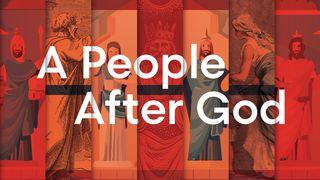Standing in Humility and HopeSample

Day 6 | Called for a Purpose
Read: Romans 8:26-30
Prayer, Sonship and the Sovereignty of God
26 In the same way, too, the spirit comes alongside and helps us in our weakness. We don’t know what to pray for as we ought to; but that same spirit pleads on our behalf, with groanings too deep for words. 27 And the Searcher of Hearts knows what the spirit is thinking, because the spirit pleads for God’s people according to God’s will.
28 We know, in fact, that God works all things together for good to those who love him, who are called according to his purpose. 29 Those he foreknew, you see, he also marked out in advance to be shaped according to the model of the image of his son, so that he might be the firstborn of a large family. 30 And those he marked out in advance, he also called; those he called, he also justified; those he justified, he also glorified.
THE KINGDOM NEW TESTAMENT: A CONTEMPORARY TRANSLATION by N.T. WRIGHT. Copyright (c) 2011 by Nicholas Thomas Wright. Courtesy of HarperCollins Publishers. Used by permission.
Reflect:
How have you heard this passage used in the past? The translation used here from Prof. N.T. Wright differs from many modern translations in that it says, “God works all things together for good with those who love him.”
What is the significance of God being the subject of the verb “working,” and of God working together with those who love God?
Consider:
Getting our minds around a fresh reading of Romans 8:28 may be difficult. Western Christians have some unlearning to do, as well as some new learning. Ever since the Middle Ages, the Western Church has been fixated on how to get to heaven and how to avoid hell, and how to be sure one is on the right path. The result is that the church has read all its key texts as though this was what they must have been talking about. But as Israel's prophets would tell you, salvation is not simply God's gift to people; it is God's gift through people to the wider world. This is what God's call is all about.
We can think about how Paul himself uses the language of being called. In Galatians 1:16, he describes his own call on the Damascus Road, which was, he says, because God intended to reveal his son in me. When God reaches out with the gospel and calls someone, this isn't simply a synonym for conversion. It is God's call for a purpose.
This is not about how Paul or anyone else “gets saved.” It's about how God works with Paul and how Paul works with God for the wider work of the gospel. God goes to work in this period when all creation is groaning through the Spirit-led prayer life, particularly the lament of God's people, whereby we are formed into the Messiah pattern. The place where the healing love of God and the convulsive pains of the world come together, producing a depth of prayerful groaning which can't even attain articulate speech.
That's what Paul has in mind here in verse 28. “Those who love God,” after all, is not a miscellaneous designation for Christians plucked out of thin air. It summarizes what's happening in verses 26 and 27. Those in whose hearts the Spirit has produced that God-directed groaning, which is heard and known by God, the heart-searcher, have become the location of the triune love of God. Thus, Paul's point, tying together verses 27 and 28, is that the Spirit-led God-lovers are assured that God is at work with them and, therefore, through them. God's ultimate will is set forth by God's sovereign action, taking up within itself the active groaning of the image-bearing people. The gospel-shaped call of God to human beings is not, in this passage, a matter of rescuing them from sin and death, though it has that effect as well. It's about being called for a purpose. A purpose that works not just for them, but through them.
Practice:
We are God’s coworkers. Spend some time in conversation with God, both telling God how this idea makes you feel and listening for God’s responses, whether challenging, encouraging, inspiring, etc.
Scripture
About this Plan

Romans 8 is treasured by many Christians, but often misunderstood and misinterpreted. Romans 8 plunges us into the complex world of sonship and suffering, where Paul plumbs the depths of sorrow and scales the heights of joy. This is one of the most challenging and most cheering of biblical chapters. Go beyond simplistic assurance or individualistic salvation and discover the challenging vocation of humanity at the beating heart of faith.
More
Related plans

Built to Serve

Made for This

And His Name Shall Be Called

Overcoming Fear: A 5-Day Journey to Freedom, Faith, and the Father’s Embrace

Impulses for the Way: 30 Days on the Camino De Santiago

Be Still and Know

Christmas in Psalm 16: Fullness of Joy

7 Habits of a Mature Disciple

Lessons From Some Hidden Heroes in the Bible
